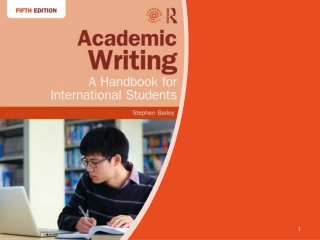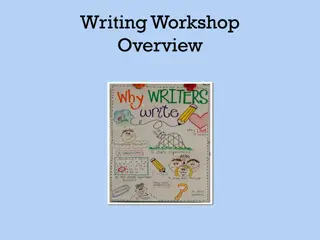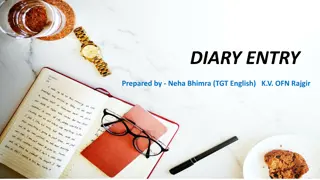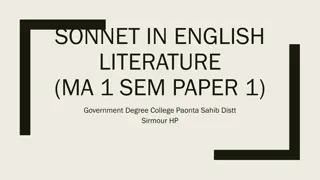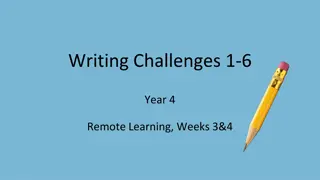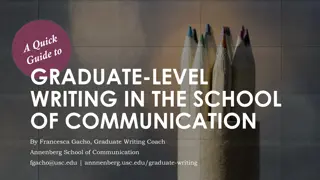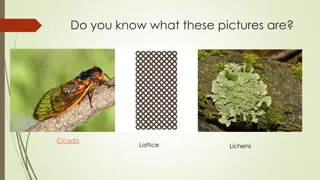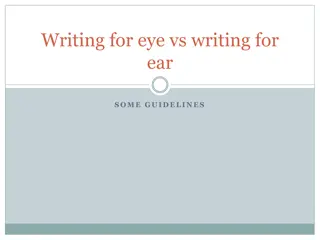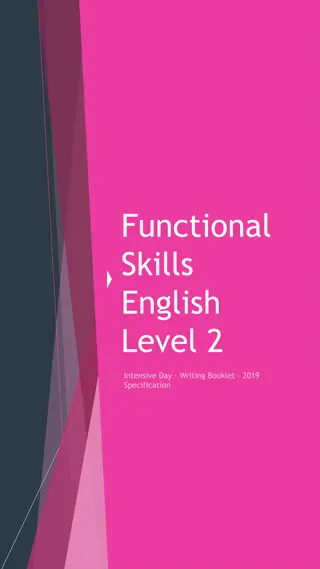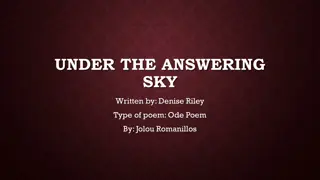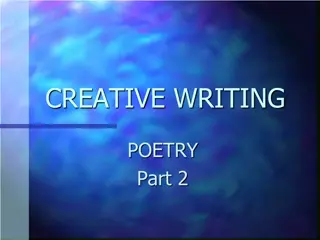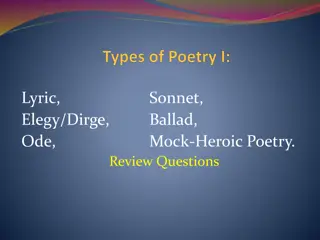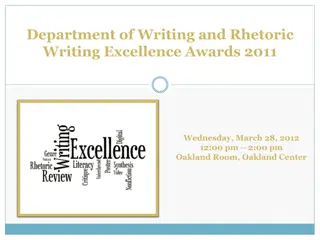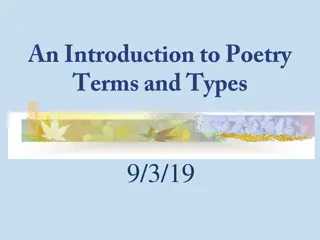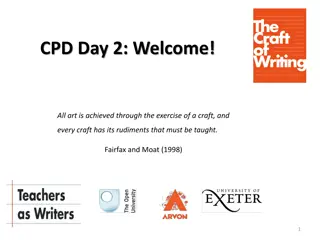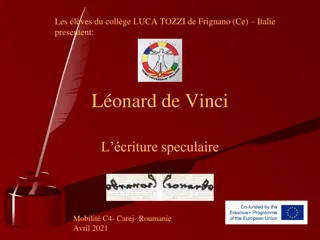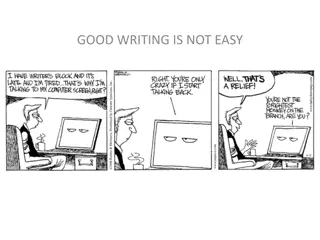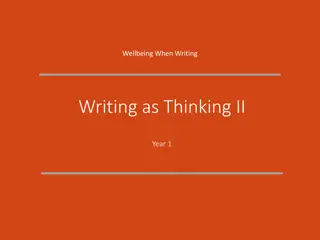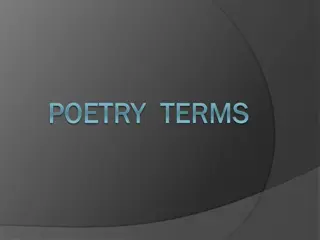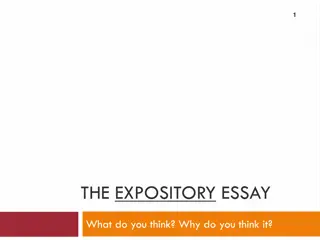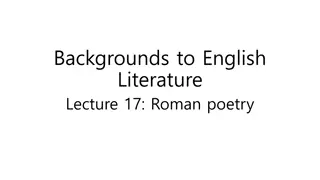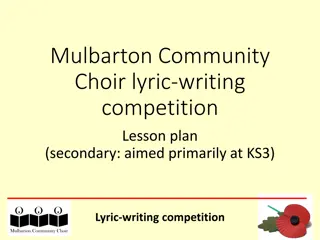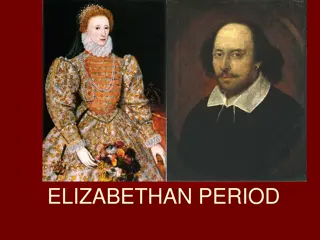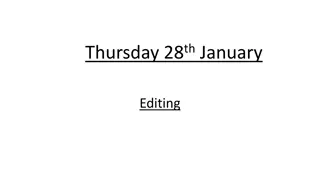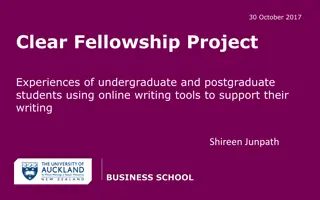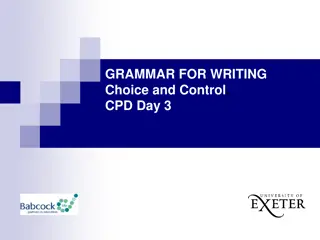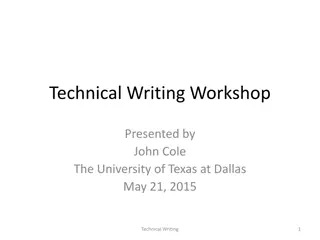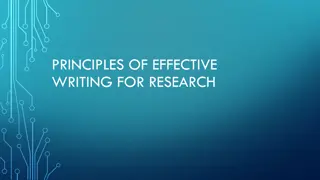Understanding the Academic Writing Process
Explore the stages involved in academic writing, from analyzing the title to proofreading the final draft. Learn about the basics of writing, types of academic writing, common reasons for writing, and text components like paragraphs and citations.
1 views • 42 slides
Exploring Citizen Journalism and Non-Fiction Writing
Explore the world of citizen journalism and non-fiction writing, learning about text types, adapting writing to conventions, considering audience, purpose, and tone. Discover the significance and usefulness of non-fiction writing, and delve into creating various text types. Uncover the role of citiz
1 views • 11 slides
Comprehensive Overview of English Writing Course
This comprehensive English writing course, led by lecturer Muhammad Muslim Nasution, covers various aspects such as grammar, vocabulary, writing styles, and assessments. Students are required to actively participate, submit assignments, attend classes regularly, and produce writing projects. The cou
2 views • 8 slides
Comprehensive Guide to Writing Workshop Essentials
Explore the fundamental elements of a successful writing workshop, including connecting Common Core standards with writing practices, emphasizing the writing process over the final product, establishing a conducive room environment, and providing essential materials for effective writing sessions.
1 views • 18 slides
The Musical Legacy of Hildegard von Bingen: First Named Composer of the Middle Ages
Hildegard von Bingen (1098-1179) was the pioneering composer of the middle ages, known for her monophonic music characterized by soaring melodies. Despite no formal training, she created a significant body of work, including 77 lyric poems set to music in Symphonia armonie celestium revelationum. He
2 views • 6 slides
Guide to Diary Writing: Tips and Examples
Diary writing is a personal form of expression loved by both young and old. The quality of diary writing depends on creativity and imagination. A good diary entry should include day, date, time, a descriptive heading, and be written in first person. Writing informally and experientially adds authent
2 views • 9 slides
Mastering Academic Writing: Strategies for Success
Academic writing is a formal style of writing with specific characteristics such as accuracy, brevity, and clarity. Understanding academic style is crucial for success in your course as it reflects your engagement with the content. Successful academic writers read, learn new vocabulary, and have a s
0 views • 23 slides
Challenges and Perspectives in Academic Writing for English Learners: Insights from Yemeni Students and Educators
Exploring the challenges and experiences of MA English students in academic writing, the narrative reveals issues faced by learners in Yemen such as outdated curricula, lack of teaching aids, and struggles with writing skills. Insights from a teacher highlight improvements in syllabi yet continued c
0 views • 14 slides
The Art of Sonnets in English Literature
A sonnet is a 14-line lyric poem written in iambic pentameter with a specific rhyme scheme and thought structure. There are three main types of sonnets - Italian/Petrarchan, Spenserian, and English/Shakespearian. Each type has a unique rhyme scheme and style. Notable poets like Shakespeare, Spencer,
0 views • 13 slides
Academic Writing Essentials: Background, Types, and Formats
Explore the essential aspects of academic writing in this comprehensive guide. Learn about the purpose of academic writing, common types such as projects and essays, and the formats for short and long writing tasks. Discover the features of academic writing like accuracy, objectivity, and formal sty
4 views • 46 slides
Year 4 Writing Challenges for Remote Learning - Weeks 3 & 4
Engage in a series of creative writing tasks focusing on creating an imaginative character, using imaginative vocabulary, writing a personal letter, using persuasive language, and writing a newspaper report inspired by Chapter 1 to 6 of "The Iron Man." Explore various writing skills while immersing
1 views • 7 slides
Understanding Graduate-Level Writing in Academic Communication
Explore the nuances of academic writing at the graduate level in the School of Communication with Francesca Gacho, a Graduate Writing Coach. Learn about the features, characteristics, and strategies necessary for various genres of writing in this context. Discover the expectations and conventions of
2 views • 30 slides
Exploration of Poetry Forms: Cicada, Lattice Lichens, Lyric Ode, and Poetic Analysis
Discover the beauty and intricacies of poetry through the exploration of images depicting Cicada, Lattice Lichens, Lyric Ode, and poetic analysis. Dive into the world of Odes, Lyrical poems, and analyze how poets use form and figurative language to express emotions and ideas. Uncover themes of natur
0 views • 6 slides
Writing for the Ear vs. Writing for the Eye - Guidelines
Writing for the ear requires a different approach than writing for the eye. It involves focusing on clarity, brevity, and accuracy, as listeners do not have the luxury of re-reading. This method is crucial for speeches, radio scripts, and commercials to ensure effective communication. The importance
1 views • 17 slides
Mastering Functional Skills English Level 2: Writing Section Guide
Functional Skills English Level 2 focuses on reading and writing exams, along with a speaking and listening component. This course enhances your comprehension and writing abilities, teaching you to extract meaning from texts and craft your own writings using various techniques. The writing section i
1 views • 32 slides
Reflections Under the Answering Sky: An Ode to Loneliness and Connection
Exploring themes of loneliness and connection, 'Under the Answering Sky' delves into the complex emotions evoked by solitude and the desire for companionship. Through vivid imagery and thoughtful lyric and figurative devices, the poem contemplates the interactions between the living and the dead, hi
0 views • 7 slides
Exploring Different Types of Poetry
Delve into the world of poetry with acrostic, cinquain, haiku, lyric, riddle, and shape poems. Learn how each form uniquely expresses emotions through words and structure. Discover the beauty of crafting verses that evoke imagery, emotions, and thought-provoking riddles.
0 views • 13 slides
Understanding Different Forms of Poetry
Explore the characteristics of different types of poetry such as lyric, elegy/dirge, ode, sonnet, ballad, and mock-heroic poetry. Delve into the personal feelings expressed in lyric poems and the structured beauty of sonnets. Discover the emotive power of elegies and the celebratory nature of odes.
2 views • 15 slides
Creative Teaching Approaches for Persuasive Writing Workshop
The workshop focuses on using Grammar for Writing principles to enhance teaching of persuasive writing, emphasizing modal verbs and adverbials. It encourages creative writing by engaging young writers' imaginations and beliefs, allowing freedom to explore ideas. Participants learn key teaching princ
0 views • 51 slides
Department of Writing and Rhetoric Writing Excellence Awards 2011
The Department of Writing and Rhetoric at Oakland University organized the Writing Excellence Awards in 2011, recognizing outstanding submissions across various categories including writing from/about sources, original research, visual and/or auditory composition, fiction, and creative nonfiction. T
1 views • 42 slides
Comprehensive Guide to Kindergarten Writing Training for NYSESLAT 2019
Explore a detailed guide on Kindergarten Writing Training for the NYSESLAT 2019 exam. The training covers four constructed-response types including Letter Writing, Word Writing, Sentence Writing, and Writing a Story. Gain insights into the application of holistic writing rubrics, analyzing student r
0 views • 24 slides
Exploring the Beauty of Poetry: Forms, Types, and Emotions
Dive into the world of poetry and discover its various forms, from fixed to free verse, and types such as lyric, narrative, and dramatic. Explore the emotional depth of lyric poetry through odes and sonnets, with excerpts from renowned poets like Shakespeare. Uncover the power of words to evoke feel
0 views • 32 slides
Craft of Writing Framework for Teaching Writing
Explore the Craft of Writing Framework to enhance your teaching of writing skills, transforming your Arvon residential experiences into effective classroom strategies. Embrace language choices, text-level decisions, authorship, writing processes, and reader-writer relationships to empower students i
0 views • 39 slides
Enhancing Postgraduate Academic Writing: Feedback Collaboration Model
Developing a collaborative model for postgraduate academic writing courses involves understanding the role of feedback, focusing on content feedback, and exploring the intersections between discipline specialist and writing tutor feedback to improve academic writing abilities. Feedback offers valuab
1 views • 27 slides
Leonardo da Vinci and His Mirror Writing
The students of Luca Tozzi College in Frignano, Italy, explore Leonardo da Vinci's specular writing, a unique form of left-handed writing that can only be deciphered using a mirror. Discover Leonardo's diverse talents as a painter, inventor, scientist, and writer, with a mysterious side to him as a
0 views • 14 slides
Mastering the Art of Good Writing
Crafting compelling writing requires attention to detail, from intriguing leads to precise word choices and smooth transitions. Explore the essential elements of good writing, including tips for engaging readers and a checklist for evaluating writing quality. Learn about different types of leads in
0 views • 42 slides
Enhancing Wellbeing Through Writing: Writing as Thinking
Explore the connection between writing and thinking as a vital tool for academic writing. Delve into strategies for effective writing, evaluating its impact on rigorous thinking, and overcoming challenges through reflective writing exercises.
0 views • 34 slides
Enhancing Writing Skills at Escrick C of E Primary School
At Escrick C of E Primary School, the approach to English education focuses on core skills like phonics, reading, writing, and letter formation. The curriculum incorporates a variety of text types and genres, including persuasive writing, biographies, fiction, and poetry. Writing activities are embe
0 views • 10 slides
Writing in Computer Science Research: Enhancing Technical Writing Skills
This course overview covers the main objectives, class structure, and learning outcomes of a Computer Science Research Writing course focused on developing students' writing abilities, providing constructive criticism, and applying technical writing concepts to research papers in a workshop format.
0 views • 46 slides
Exploring Poetry: Terms and Techniques
Explore the world of poetry with a focus on key terms and techniques such as lyric poetry, myth, rhythm, epithet, imagery, implied metaphor, epic, onomatopoeia, symbolism, alliteration, rhyme, assonance, and personification. Enhance your understanding of these concepts through vivid examples and ima
0 views • 21 slides
The Power of Expository Writing: Importance and Impact
Expository writing is essential for clear communication and expressing thoughts effectively through written words. This form of writing helps convey ideas, information, and opinions concisely, making it crucial for academic, professional, and personal communication. The structure of expository writi
0 views • 30 slides
Overview of Roman Poetry and The Eclogues: A Study in Roman Literature
Roman poetry encompassed various genres such as epic, drama, lyric, satire, and pastoral, with poets like Virgil and Catullus making significant contributions. The neoteric poets, inspired by Hellenistic traditions, added a new dimension to Roman poetry. The Eclogues by Virgil, drawing from Theocrit
0 views • 17 slides
Secondary Lesson Plan: Lyric Writing Competition for KS3 Students
Secondary lesson plan focusing on a lyric writing competition for KS3 students, with a theme of peace and remembrance. The lesson includes activities like creating magpie tables, exploring emotions through music, and writing a chorus for a potential choir performance. Multiple curriculum links are i
0 views • 15 slides
The Flourishing Elizabethan Period in English Literature
The Elizabethan period, characterized by the reign of Queen Elizabeth I, was a time of significant cultural and literary growth in England. This era saw a robust development of drama and lyric poetry, with notable figures like William Shakespeare making their mark. Amidst political turbulence and re
0 views • 20 slides
Spring into Writing: Enhancing Writing Skills for Children
Join us for an evening dedicated to enhancing writing skills for children according to Maryland College and Career-Ready Standards. Learn about writing expectations, get motivated writing ideas for children, and explore fun writing opportunities at home. The event will provide insights into differen
1 views • 19 slides
Learning to Edit and Improve Writing Skills
Today's lesson focuses on editing and correcting mistakes in writing, emphasizing the importance of identifying errors in spelling, punctuation, and grammar. Students are encouraged to review their own work, make necessary edits, and enhance their writing by using synonyms and improving word choice.
0 views • 6 slides
Exploring the Impact of Online Writing Tools on Student Writing Experiences
This project by Shireen Junpath delves into the experiences of undergraduate and postgraduate students using online writing tools to enhance their writing skills. The study aims to understand the effectiveness of tools like Grammarly, Lextutor, and Academic Phrasebank from the perspectives of studen
0 views • 27 slides
Creative Teaching Approaches in Grammar and Writing Intervention
Re-iterating teaching principles for writing intervention, focusing on grammatical subject knowledge, adverbials, modal verbs, and passive voice. Emphasizing creative teaching methods for persuasive writing, fostering imagination, emotions, and personal beliefs in young writers. Incorporating space
0 views • 60 slides
Comprehensive Technical Writing Workshop by John Cole at The University of Texas at Dallas
Explore the world of technical writing with John Cole, an experienced instructor at The University of Texas at Dallas. This workshop covers the fundamentals of technical writing, including course objectives, programming, course outline, traits of technical writing, and what technical writing truly e
0 views • 58 slides
Writing Research Papers Effectively: Guidelines and Steps
Effective writing for research involves developing a good research idea, writing a literature review, and understanding the key elements of writing research articles. This process includes coming up with a strong research question, gathering relevant information, creating an outline, writing the dra
0 views • 26 slides
